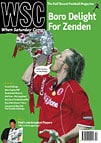 The word ‘Judas’ has been heard a lot lately, but Adam Powley refuses to ignore a fundamental difference between fans and players
The word ‘Judas’ has been heard a lot lately, but Adam Powley refuses to ignore a fundamental difference between fans and players
The issue of loyalty is a bit of a bête noire for football supporters. While fans readily display their devotion to the cause, players rarely match such selflessness. That discrepancy was sharply illustrated by three high-profile moves during the recent transfer window. The deals involving Scott Parker, Jermain Defoe and Louis Saha accounted for an aggregate outlay of over £30 million – not bad going for three young players, none of whom is yet to make a significant impact at full international level. But while the purchasing clubs glowed in the satisfaction of being seen to splash cash in supposedly depressed times, at the clubs they departed from there were bitter recriminations.
Each player was held to be “betraying” the selling club, with fans and those in charge quick to articulate their anger. Saha felt the full scorn of Fulham supporters, while at Charlton comments from management and board echoed the accusations of “Judas” hurled in Parker’s direction by The Valley’s paying public. “They kiss the badge one week and then kiss someone else’s the next,” said Alan Curbishley.
At Upton Park, they went further, with chairman Terry Brown offering the no-doubt informed medical opinion that Defoe’s head “wasn’t right”, while manager Alan Pardew expressed tender sympathies for young West Ham fans who had Defoe on their replica shirts. Presumably, in the months prior to Defoe actually leaving Upton Park, when it had been patently obvious that he would be sold should the right offer come in, West Ham had of course nobly refused to take any money from innocent junior Hammers seeking Defoe-related merchandise in the club shop.
Such comments strike at the heart of the double standards that clubs and fans apply to transfers. They also expose the notion of player loyalty as an ultimately meaningless conceit. Like it or loathe it, the transfer business is a predatory food chain – clubs exploit those below them and are in turn exploited by those with larger budgets. Players will for ever more be tempted, regardless of any declared “love” for a particular club.
Defoe provides a glaring example: five years ago West Ham used their leverage as a “bigger” club and poached the then 16-year-old from Charlton. When the boot was on the other foot, there was an outcry from board, management and fans at West Ham, some of whom clearly have short memories. Spurs fans will have no cause for complaint if, in a year or two, Defoe begins to talk about wanting to leave White Hart Lane for “a bigger stage”. Indeed, given their pained reaction to the departure of Sol Campbell, if Tottenham fans should have learned anything it is not to place trust in players or to rage against their lack of loyalty.
There are obvious differences to the Campbell departure and the recent moves of Saha, Parker and Defoe – not least that the selling clubs at least received hefty transfer fees to soften the blow – but in the final analysis, all moved for the same reason: to play at what they regarded as a higher level with better rewards.
That fans should despair at the disloyalty of players wooed to play elsewhere is understandable, but futile. Players are not supporters, for all their “I love this club” protestations to the contrary. Until the whole system of transfers changes, possibly along the lines of the American draft system, in-demand players will always be picked up by the bigger clubs.
All fans can really ask for is a shred of honesty. Defoe’s instant demand for a move in the wake of West Ham’s relegation last season was roundly condemned, but was surely more truthful than that of other players who said they would stay on and do their bit, only to leave as soon as the first decent offer arrived. There is perhaps another lesson to be learned, as expressed by a West Ham supporting friend whose young daughter was distraught at seeing her hero Defoe switch to the club’s bitter London rivals. “One thing’s for certain, he said. “Next time one of my kids asks for a player’s name printed on their shirt, I’m going to make sure it’s ‘Moore’.”
From WSC 206 April 2004. What was happening this month